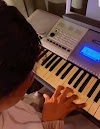### Experience vs. Skill: Why Years of Piano Practice Don’t Always Equal Proficiency
When it comes to mastering the piano, the number of years you’ve spent learning doesn’t necessarily determine your level of proficiency. While time is an important factor in developing skill, it is not the only one. Several elements contribute to becoming a proficient pianist, and someone who has spent fewer years practicing can sometimes surpass those with more years of experience. Here’s why:
### Quality of Practice
1. **Effective Practice Techniques**: The quality of practice often matters more than the quantity. Focused, deliberate practice, where you work on specific skills and techniques, can lead to faster improvement than merely playing through pieces without addressing weaknesses.
2. **Consistent Practice**: Regular, short practice sessions are often more effective than infrequent, lengthy ones. Consistency helps reinforce learning and build muscle memory more efficiently.
### Instruction and Guidance
1. **Quality of Instruction**: A student with access to a skilled teacher who provides clear, constructive feedback and guidance can progress faster than someone who has spent more years with less effective instruction.
2. **Access to Resources**: Utilizing various learning resources, such as online tutorials, apps, and workshops, can supplement regular lessons and enhance learning.
### Personal Motivation and Passion
1. **Intrinsic Motivation**: A highly motivated student who is passionate about the piano is likely to practice more effectively and with greater enthusiasm, leading to faster progress.
2. **Setting Goals**: Setting specific, achievable goals can provide direction and motivation, helping students progress more rapidly regardless of the time spent learning.
### Adaptability and Learning Style
1. **Adaptability**: Some individuals are naturally more adaptable and can pick up new skills and techniques more quickly.
2. **Learning Styles**: Understanding and leveraging one’s learning style can make practice sessions more effective. For instance, auditory learners might benefit from listening to recordings, while visual learners might prefer sheet music or video tutorials.
### Mindset and Attitude
1. **Growth Mindset**: Embracing a growth mindset, where challenges are seen as opportunities to learn rather than obstacles, can lead to continuous improvement and faster skill acquisition.
2. **Resilience**: Overcoming setbacks and persevering through difficulties is crucial for long-term progress. Those who view mistakes as learning opportunities tend to improve more quickly.
### Practical Experience
1. **Performance Opportunities**: Regularly performing in front of others, whether in recitals, informal gatherings, or competitions, can accelerate learning and build confidence.
2. **Varied Repertoire**: Exploring different musical styles and pieces can enhance technical skills and musicality more effectively than sticking to a limited repertoire.
### Final Thoughts
While the amount of time spent learning the piano is certainly important, it is not the sole determinant of proficiency. Effective practice, quality instruction, personal motivation, adaptability, a positive mindset, and practical experience all play crucial roles in becoming a skilled pianist. Thus, someone who has spent fewer years learning the piano can indeed become better than someone with more years of experience, provided they optimize these factors.










0 Comments